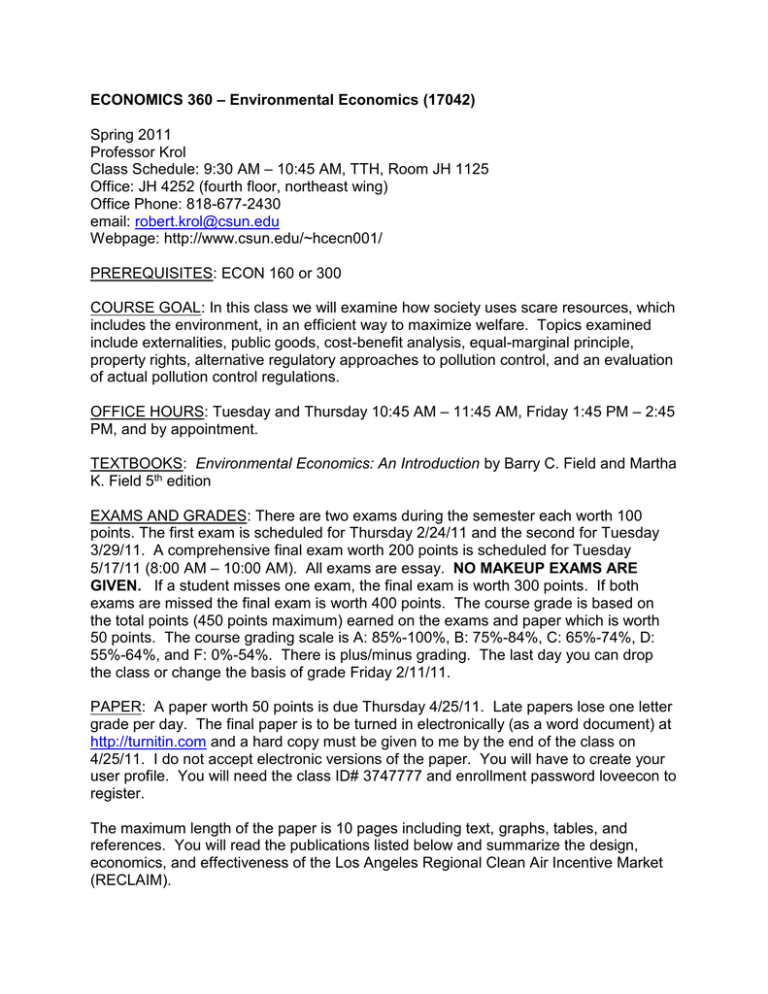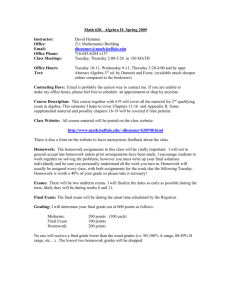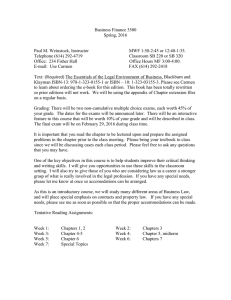– Environmental Economics (17042) ECONOMICS 360 Spring 2011
advertisement

ECONOMICS 360 – Environmental Economics (17042) Spring 2011 Professor Krol Class Schedule: 9:30 AM – 10:45 AM, TTH, Room JH 1125 Office: JH 4252 (fourth floor, northeast wing) Office Phone: 818-677-2430 email: robert.krol@csun.edu Webpage: http://www.csun.edu/~hcecn001/ PREREQUISITES: ECON 160 or 300 COURSE GOAL: In this class we will examine how society uses scare resources, which includes the environment, in an efficient way to maximize welfare. Topics examined include externalities, public goods, cost-benefit analysis, equal-marginal principle, property rights, alternative regulatory approaches to pollution control, and an evaluation of actual pollution control regulations. OFFICE HOURS: Tuesday and Thursday 10:45 AM – 11:45 AM, Friday 1:45 PM – 2:45 PM, and by appointment. TEXTBOOKS: Environmental Economics: An Introduction by Barry C. Field and Martha K. Field 5th edition EXAMS AND GRADES: There are two exams during the semester each worth 100 points. The first exam is scheduled for Thursday 2/24/11 and the second for Tuesday 3/29/11. A comprehensive final exam worth 200 points is scheduled for Tuesday 5/17/11 (8:00 AM – 10:00 AM). All exams are essay. NO MAKEUP EXAMS ARE GIVEN. If a student misses one exam, the final exam is worth 300 points. If both exams are missed the final exam is worth 400 points. The course grade is based on the total points (450 points maximum) earned on the exams and paper which is worth 50 points. The course grading scale is A: 85%-100%, B: 75%-84%, C: 65%-74%, D: 55%-64%, and F: 0%-54%. There is plus/minus grading. The last day you can drop the class or change the basis of grade Friday 2/11/11. PAPER: A paper worth 50 points is due Thursday 4/25/11. Late papers lose one letter grade per day. The final paper is to be turned in electronically (as a word document) at http://turnitin.com and a hard copy must be given to me by the end of the class on 4/25/11. I do not accept electronic versions of the paper. You will have to create your user profile. You will need the class ID# 3747777 and enrollment password loveecon to register. The maximum length of the paper is 10 pages including text, graphs, tables, and references. You will read the publications listed below and summarize the design, economics, and effectiveness of the Los Angeles Regional Clean Air Incentive Market (RECLAIM). Hall, Jane and Walton, Amy, 1996, “A Case Study in Pollution Markets: Dismal Science VS. Dismal Reality,” Contemporary Economic Policy, 14, 67-78. Harrison, David, 2004, “Ex Post Evaluation of the RECLAIM Emissions Trading Programmes for the Los Angeles Air Basin,” in Tradable Permits: Policy Evaluation, Design, and Reform, Paris: OECD, 45-69. Additional and current information can be found at www.aqmd.gov/reclaim/index.htm. In order to get an A or B on the paper, it must include economic analysis (use economic theory) to explain the issue and be well written. Papers that do not contain any economic analysis will receive a grade of C, at best. Poorly written papers without economic analysis will receive a grade of F. ACADEMIC DISHONESTY: Cheating on exams or paper will result in the student receiving an F in the course and a letter will be placed in your file at CSUN. For more information go to www.csun.edu/catalog/appendices.html#E2. Other Rules: I expect you to be on time for class and to act professionally. If you have to leave early, sit at the end of a row so you minimize disturbing other students. Do not use your cell phone during class. They should always be turned off before you enter the classroom. You can use your laptop to take notes. However, if the laptop becomes a distraction to the class, I reserve the right to prevent you from using it in class. I expect you to do the reading and assigned problems before class. TENTATIVE READING ASSIGNMENTS: 1. Introduction: chapters 1 and 2 2. Analytical Tools: chapters 3 – 5 3. Environmental Analysis: chapters 6 – 8 4. Environmental Policy Analysis: chapters 9 – 13 5. Environmental Policy in the United States: chapters 14 – 17 6. International Environmental Issues: chapters 18 - 21


